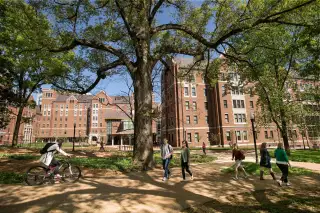The 10 Colleges With the Most Generous Financial Aid

If you need a lot of financial help to pay for college, you'll have much better odds at a schools that has a generous aid budget.
Unfortunately, these days that's a small group. The average college provides only enough scholarships or grants to meet 70% of what low- and moderate-income students need to pay the bills, according to data provided by the colleges to Peterson's.
In all, only 64 colleges in the country say they hand out enough aid to meet the full demonstrated financial need of every regularly admitted undergraduate, according to Peterson's data. And many members of that elite group, including schools in the Ivy League, don't provide a penny in merit scholarships. That means no scholarships to students who don't qualify for need-based aid, no matter their academic achievements.
So Money crunched financial-aid data to find the 10 schools on our Best College Values list that not only provide 100% of the scholarship money they think you need, but also have large merit-aid budgets to help high-achieving, wealthier students.
It's important, however, to be realistic about what's "generous." When colleges say they "meet full demonstrated need," that doesn't mean they give everybody full-tuition scholarships. Colleges first calculate how much they think your family can afford to pay (also known as the "expected family contribution"), using the financial information you provide on the FAFSA or the College Board's CSS/Financial Aid Profile.
On top of that number, many colleges add an expectation that students will take out loans and earn a few thousand dollars a year. The difference between the total expected student and parent contribution and the cost of the college is your "need." That's the amount that the most generous colleges will provide in need-based scholarships. Merit scholarships are awarded without regard to your family's financial situation. (For tips on how to appeal for additional aid, click here.)
| School | Money rank | Avg. est. total family education-related debt | Est. average net price of a degree | % of students who get merit awards | Average merit grant |
|---|---|---|---|---|---|
| Vanderbilt University | 49 | $6,649 | $160,791 | 10% | $23,789 |
| Rice University | 20 | $8,447 | $149,851 | 15% | $11,833 |
| Duke University | 32 | $9,694 | $192,804 | 12% | $19,823 |
| Davidson College | 72 | $10,842 | $165,141 | 6% | $22,246 |
| Grinnell College | 144 | $11,325 | $123,981 | 15% | $15,093 |
| University of Chicago | 106 | $12,986 | $188,813 | 17% | $10,205 |
| Kenyon College | 94 | $13,313 | $190,407 | 13% | $13,040 |
| University of Richmond | 120 | $14,317 | $157,221 | 16% | $23,300 |
| Washington and Lee University | 39 | $15,270 | $149,377 | 8% | $35,060 |
| Harvey Mudd College | 7 | $17,736 | $187,694 | 20% | $9,743 |
Notes: Average total estimated debt is federal student debt and parent Plus loan borrowing per graduating senior; net price for freshman starting in the fall of 2014.
Sources: Peterson's, U.S. Department of Education, Money calculations.